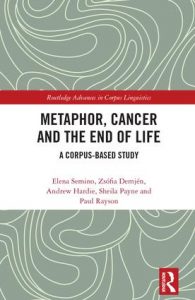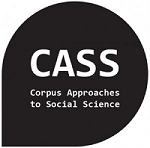
Why language matters when discussing terminal illness and death
(Originally on the Society for Editors and Proofreaders blog on 16 January 2015)
by Zsófia Demjén
How do people talk about the end-of-life and death? And why does it matter? The language used at these, often difficult, times can have a great impact according to Zsófia Demjén, a linguist and lecturer at The Open University‘s Department for Applied Linguistics and English Language. She offers food for thought for anyone editing text that includes a description of serious illness or death.
How people talk about something, so the theory goes, can tell us as much about what they think as the content of what they’re actually saying. This is the premise of the Economic and Social Research Council (ESRC) funded ‘Metaphor in End-of-Life Care’ (MELC) project at Lancaster University.
Over 20 months, an interdisciplinary group of researchers (linguists, computer scientists and palliative care specialists) led by Elena Semino scrutinised the spoken and written language used by terminally ill patients, family carers and the healthcare professionals who work with them. They collected 1.5 million words of interviews with and contributions to online fora by the three groups and focused specifically on what kinds of metaphors they used and how.
Metaphor involves talking and thinking about one thing in terms of another. When you say that someone died after a ‘battle’ with cancer, you talk about being ill and attempting to get better in terms of military conflict. When you say that someone has ‘passed away’, you talk about dying in terms of a movement away from a current location. Metaphors are interesting because they are often used in describing complex, emotional, subjective and taboo experiences, such as health, illness and death. They can convey things indirectly but also vividly and concisely. Any systematic patterns suggest underlying attitudes, thoughts and needs of those using the expressions. For example, early on in the project the team noticed that death is talked about in at least two ways: sometimes it’s something that approaches the patient, ‘they are aware the end of their life is coming’, and sometimes the patient moves towards it, ‘some people are very, very upfront about talking about death and dying and “that’s where I’m going. It is my end-of-life”‘.
Different ways of describing the same thing have different implications and suggest different underlying attitudes. Death approaching the patient can imply that he or she has no control or influence over what is happening to them. While this may ultimately be true for all of us, various aspects of the experience of terminal illness are open to influence and the second framing (patient approaching death) allows for that more easily. This is a common theme: metaphors, in their entailments and implications, always foreground certain aspects of whatever experience they’re describing, while backgrounding others.
The proverbial ‘battle’ and ‘journey’ metaphors for illness are no different. Examples such as ‘staying as positive as possible is a proven way of fighting back’ and ‘I am ready to kick ass! Bring it on!’ highlight the ways in which being ill may involve strength, perseverance, endurance and heroism, and encourage us to see recovery as a victory (and not recovering or dying as defeat). But these examples also background the possibility of seeing illness as part of life, as something to go through or as a journey shared with others: ‘We met all sorts on our cancer journey’; ‘you seem to have come through the tunnel of cancer and are on the mend’.
These and many other types of metaphors are used by all three groups in the MELC dataset. No single metaphor is objectively superior to another; different metaphors may be more or less appropriate for different people, or for the same person at different times. When people describe their experiences or when others describe these for them, it is crucial that there are a variety of options so that vulnerable people don’t have unsuitable framings imposed on them. At the same time, it is important to be aware of the entailments of each choice in case they point to underlying issues that require attention.





